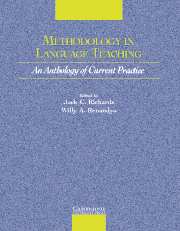Book contents
- Frontmatter
- Contents
- Acknowledgments
- Introduction
- Section I Approaches to Teaching
- Section 2 Lesson Planning and Classroom Management
- Section 3 Classroom Dynamics
- Section 4 Syllabus Design and Instructional Materials
- Section 5 Task and Project Work
- Section 6 Learning Strategies
- Section 7 Teaching Grammar
- Section 8 Teaching Pronunciation
- Section 9 Teaching Speaking
- Section 10 Teaching Listening
- Section 11 Teaching Vocabulary
- Section 12 Teaching Reading
- Section 13 Teaching Writing
- Section 14 Assessment
- Chapter 33 Alternative Assessment: Responses to Commonly Asked Questions
- Chapter 34 Nontraditional Forms of Assessment and Response to Student Writing: A Step Toward Learner Autonomy
- Chapter 35 English Proficiency Test: The Oral Component of a Primary School
- Section 15 Technologies in the Classroom
- Section 16 Professional Development
- Credits
- Author Index
- Subject Index
- References
Chapter 34 - Nontraditional Forms of Assessment and Response to Student Writing: A Step Toward Learner Autonomy
Published online by Cambridge University Press: 10 November 2010
- Frontmatter
- Contents
- Acknowledgments
- Introduction
- Section I Approaches to Teaching
- Section 2 Lesson Planning and Classroom Management
- Section 3 Classroom Dynamics
- Section 4 Syllabus Design and Instructional Materials
- Section 5 Task and Project Work
- Section 6 Learning Strategies
- Section 7 Teaching Grammar
- Section 8 Teaching Pronunciation
- Section 9 Teaching Speaking
- Section 10 Teaching Listening
- Section 11 Teaching Vocabulary
- Section 12 Teaching Reading
- Section 13 Teaching Writing
- Section 14 Assessment
- Chapter 33 Alternative Assessment: Responses to Commonly Asked Questions
- Chapter 34 Nontraditional Forms of Assessment and Response to Student Writing: A Step Toward Learner Autonomy
- Chapter 35 English Proficiency Test: The Oral Component of a Primary School
- Section 15 Technologies in the Classroom
- Section 16 Professional Development
- Credits
- Author Index
- Subject Index
- References
Summary
INTRODUCTION
This paper will discuss new options open to the language teacher in assessing and responding to student writing, and in promoting learner autonomy in the process.
The following questions are useful to start a discussion of nontraditional forms of assessment and response to student writing:
What direction should nontraditional forms of assessment for writing take?
Should they be samples of daily work such as journal entries or portfolio assessment?
Or, is the notion of general assessment completely out of synchronization with the megatrends in education where assessment and response to writing have become revolutionary?
Based on this writer's experience as teacher trainer, she has observed that the teaching and subsequent assessment of writing leave much to be desired. Not much change has been undertaken in terms of approaches and classroom procedures. Might this be owing to the fact that some of the teachers teach the way they were taught, or that some of us still cling to age-old beliefs and practices in evaluating, grading and teaching, assessing and responding to student writing?
Some of the practices that many language teachers find difficult to do away with are the following:
Teacher gives exercises and model paragraphs and essays for students to imitate. If this is all that a teacher does, then she hampers or impedes creativity on the part of the students.
Teacher lists a number of topics on the chalkboard, then asks students to choose one and write about it. This is done without so much as a preliminary activity to the actual writing exercise.
[…]
- Type
- Chapter
- Information
- Methodology in Language TeachingAn Anthology of Current Practice, pp. 344 - 353Publisher: Cambridge University PressPrint publication year: 2002
References
- 4
- Cited by



